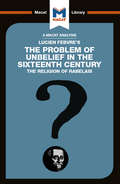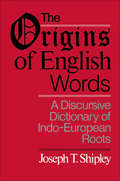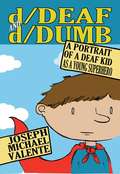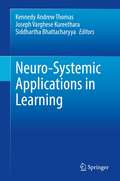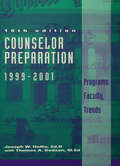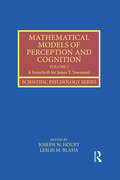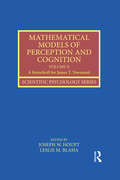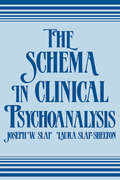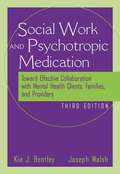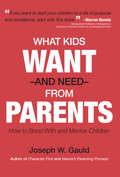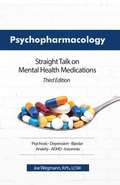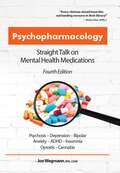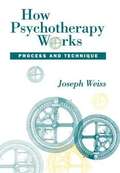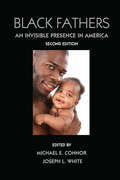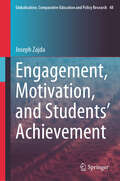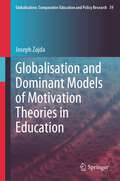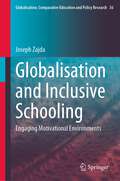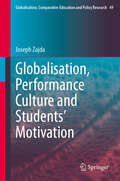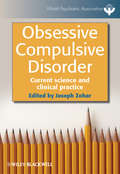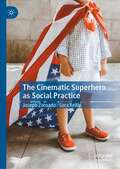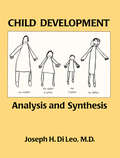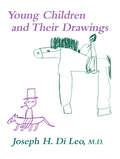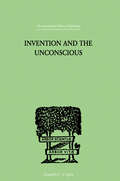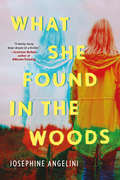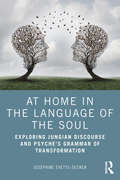- Table View
- List View
The Problem of Unbelief in the 16th Century (The Macat Library)
by Joseph TendlerFebvre asked this core question in The Problem of Unbelief: “Could sixteenth-century people hold religious views that were not those of official, Church-sanctioned Christianity, or could they simply not believe at all?” The answer informed a wider debate on modern history, particularly modern French history. Did the religious attitudes of the Enlightenment and the twentieth century—notably secularism and atheism—first take root in the sixteenth century? Could the spirit of scientific and rational inquiry of the twentieth century have begun with the rejection of God and Christianity by men such as Rabelais, writing in his allegorical novel Gargantua and Pantagruel – the work most often cited as a proto-"atheist" text prior to Febvre's study? The debate hinged on some key differences of interpretation. Was Rabelais mocking the structures of the Christian Church (in which case he might be anticlerical)? Was he mocking the Bible scriptures or Church doctrines (in which case he might be anti-Christian)? Or was he mocking the very idea of God’s existence (in which case he might be an atheist)? <P><P>The other great contribution that Febvre made to the study of history can be found not so much in the fine detail of this work as in the additions that he made to the historian's toolkit. In this sense, Febvre was highly creative; indeed it can be argued that he ranks among the most creative of all historians. He sought to move the study of history itself beyond its traditional focus on documentary records, arguing instead that close analysis of language could open up a gateway into the ways in which people actually thought, and to their subconscious minds. This concept, the focus on "mentalities," is core to the hugely influential approach of the Annales group of historians, and it enabled a switch in the focus of much historical inquiry, away from the study of elites and their deeds and towards new forms of broader social history. Febvre also used techniques and models drawn from anthropology and sociology to create new ways of framing and answering questions, further extending the range of problems that could be addressed by historians. Working together with colleagues such as Marc Bloch, his understanding of what constituted evidence and of the meanings that could be attributed to it, radically redefined what history is – and what it should aspire to be.
The Origins of English Words: A Discursive Dictionary of Indo-European Roots
by Joseph Twadell ShipleyThere are no direct records of the original Indo-European speech. By comparing the vocabularies of its various descendants, however, it is possible to reconstruct the basic Indo-European roots with considerable confidence. In The Origins of English Words, Shipley catalogues these proposed roots and follows the often devious, always fascinating, process by which some of their offshoots have grown.Anecdotal, eclectic, and always enthusiastic, The Origins of English Words is a diverting expedition beyond linguistics into literature, history, folklore, anthropology, philosophy, and science.
D/deaf And D/dumb: A Portrait Of A Deaf Kid As A Young Superhero (Disability Studies In Education Ser. #10)
by Joseph Valented/Deaf and d/Dumb chronicles the author's dumb, 'deaf kid' origins in Bayport, New York to his current life as a «young superhero» writer. Portraying the conflicting cultural worlds of hearing and Deaf, it describes his life in an in-between underworld and his identity as it alternates between being oppressed and empowered. These feelings are inescapably and forever the reality of those who live on the margins of our larger society.
Neuro-Systemic Applications in Learning
by Siddhartha Bhattacharyya Joseph Varghese Kureethara Kennedy Andrew ThomasNeuroscience research deals with the physiology, biochemistry, anatomy and molecular biology of neurons and neural circuits and especially their association with behavior and learning. Of late, neuroscience research is playing a pivotal role in industry, science writing, government program management, science advocacy, and education. In the process of learning as experiencing knowledge, the human brain plays a vital role as the central governing system to map the images of learning in the human brain which may be called educational neuroscience. It provides means to develop a common language and bridge the gulf between educators, psychologists and neuroscientists. The emerging field of educational neuroscience presents opportunities as well as challenges for education, especially when it comes to assess the learning disorders and learning intentions of the students. The most effective learning involves recruiting multiple regions of the brain for the learning task. These regions are associated with such functions as memory, the various senses, volitional control, and higher levels of cognitive functioning. By considering biological factors, research has advanced the understanding of specific learning difficulties, such as dyslexia and dyscalculia. Likewise, neuroscience is uncovering why certain types of learning are more rewarding than others. Of late, a lot of research has gone in the field of neural networks and deep learning. It is worthwhile to consider these research areas in investigating the interplay between the human brain and human formal/natural learning. This book is intended to bring together the recent advances in neuroscience research and their influence on the evolving learning systems with special emphasis on the evolution of a learner-centric framework in outcome based education by taking into cognizance the learning abilities and intentions of the learners.
Counselor Preparation 1999-2001: Programs, Faculty, Trends
by Joseph W. HollisNow in its tenth edition, this classic reference contains vital information in three major areas: Detailed information on each of more than 500 graduate level departments with more than 1000 counselor preparation programs; Statistical treatment with interpretations of composite national research on the six largest types of entry level (master's and sixth year) and four doctoral level counseling programs; trends based on comparison of 1999 data with longitudinal data collected periodically since 1970. New in this tenth edition is a chapter on 'The Road to Professionalism which emphasizes the individual's need to gain strong backgrounds for certification and other programs. As in previous editions, all master's and doctoral level counselor and/or therapist preparation programs in the U.S. are listed, including community, marriage/family, mental health, pastoral, gerontological, rehabilitation, school, career, and student affairs counseling. Also noted are programs accredited by the American Association for Marriage and Family Therapy, American Association of Pastoral Counselors, Council for Accreditation of Counseling and Related Educational Programs, and Council on Rehabilitation Education - plus it identifies the location of Chi Sigma Iota (Counseling Society International) chapters.In addition to listing faculty by name, degree, title, and time devoted to each program, the text gives detailed information for each separate program: degree offered; accreditation held (if any); departmental addresses and telephone numbers; admission and graduation requirements; number of students admitted and graduating yearly; experiential clock hours; placement of graduates; and the uniqueness within the program. Courses to be added or dropped by counseling departments are listed, as are other anticipated changes within departments. Using a statistical treatment of the aforementioned data, the book also interprets the status and probable trends of preparation programs within each counseling specialty. Also considered are current emphases in the counseling field, and in what ways these are being reflected within counselor education settings.
Mathematical Models of Perception and Cognition Volume I: A Festschrift for James T. Townsend (Scientific Psychology Series)
by Joseph W. Houpt Leslie M. BlahaIn this two volume festschrift, contributors explore the theoretical developments (Volume I) and applications (Volume II) in traditional cognitive psychology domains, and model other areas of human performance that benefit from rigorous mathematical approaches. It brings together former classmates, students and colleagues of Dr. James T. Townsend, a pioneering researcher in the field since the early 1960s, to provide a current overview of mathematical modeling in psychology. Townsend’s research critically emphasized a need for rigor in the practice of cognitive modeling, and for providing mathematical definition and structure to ill-defined psychological topics. The research captured demonstrates how the interplay of theory and application, bridged by rigorous mathematics, can move cognitive modeling forward.
Mathematical Models of Perception and Cognition Volume II: A Festschrift for James T. Townsend (Scientific Psychology Series #2)
by Joseph W. Houpt Leslie M. BlahaIn this two volume festschrift, contributors explore the theoretical developments (Volume I) and applications (Volume II) in traditional cognitive psychology domains, and model other areas of human performance that benefit from rigorous mathematical approaches. It brings together former classmates, students and colleagues of Dr. James T. Townsend, a pioneering researcher in the field since the early 1960s, to provide a current overview of mathematical modeling in psychology. Townsend’s research critically emphasized a need for rigor in the practice of cognitive modeling, and for providing mathematical definition and structure to ill-defined psychological topics. The research captured demonstrates how the interplay of theory and application, bridged by rigorous mathematics, can move cognitive modeling forward.
The Schema in Clinical Psychoanalysis
by Joseph W. Slap Laura Slap-SheltonSlap and Slap-Shelton proffer the schema as the basis of an internally consistent and clinically relevant model of the mind. Wedded to the dynamic and genetic points of view, the schema model accommodates the clinical realities of trauma, repetition, and sublimation while dispensing entirely with the abstract concepts of traditional metapsychology.
The Social Worker and Psychotropic Medication: Toward Effective Collaboration with Mental Health Clients, Families, and Providers (3rd edition)
by Joseph Walsh Kia J. BentleyIntended for social workers who want to understand the drugs prescribed to their clients, this text describes the central nervous system, the basic principles of pharmacology, and the specific disorders treated by antipsychotics, antidepressants, mood stabilizers, anti-anxiety drugs, and psychostimulants. The third edition reflects new medications and new uses of medications across diagnostic categories.
What Kids Want and Need From Parents
by Joseph Warren GauldWhat Kids Want-And Need-From Parents is truly a seminal book in parenting.It begins with one man's 50-year journey to discover a better way to prepare American kids for life and culminates with the amazing discovery: the biggest factor in children's success in life turns out to be dependent on how their parents deal with their own childhood!Teacher Joe Gauld sets out to change American education in the 60s, founding the Hyde School in Bath, Maine, committed to the idea every student is gifted with a unique potential. But by tracking Hyde graduates in life, he finds parenting a much larger influence on their later lives than schooling. So in 1974, he begins a program to regularly address parental growth and family issues.Hyde's extraordinary ability to bond family and school receives national media attention, and Hyde grows into a network of seven private and public schools, plus a national Hyde Biggest Job® parent program.Joe increasingly centers his work on families, finding parenting heavily influenced by how parents were raised. So parents' learning how to effectively deal with both the negative as well as the positive aspects of their upbringing becomes critical to effective parenting. Joe carefully leads the reader through this dynamic and ground-breaking parenting process.
Psychopharmacology: Straight Talk on Mental Health Medications
by Joseph Wegmann<p>Congratulations to Joe Wegmann, and his book, Psychopharmacology, 3rd Edition, for winning a silver medal at the 2016 IBPA Benjamin Franklin Awards for editorial and design excellence in the Professional & Technical category. <p>This is the definitive guide and desk reference for healthcare professionals and patients to expand their knowledge in the pharmacological and behavioral treatment of psychosis, anxiety, depression, bipolar, insomnia and ADHD.</p>
Psychopharmacology: Straight Talk on Mental Health Medications
by Joseph WegmannA comprehensive professional resource for mental health treatment – now in it’s fourth edition! Since 2009, Psychopharmacology: Straight Talk on Mental Health Medications has been the go-to desk reference for professionals who want to expand their knowledge of pharmacological treatment on mental health issues. Author Joe Wegmann draws on over three decades of clinical experience in psychopharmacology and psychotherapy, to provide his unique perspective on psychotropic medication management. He is nationally known for the practical, relevant, and insightful psychopharmacology information he presents in his books, columns, articles, blogs, and workshops – and this edition is no exception. Packed with detailed discussions of clinical diagnoses, as well as the effectiveness of current treatments, including complementary and alternative medicine, this fourth edition provides the reader a useable blend of the science and art associated with contemporary best practices.
How Psychotherapy Works: Process and Technique
by Joseph Weiss<P>In the landmark volume, THE PSYCHOANALYTIC PROCESS, Joseph Weiss presented a bold, original theory of the therapeutic process. Now, in HOW PSYCHOTHERAPY WORKS, Weiss extends his powerful theory and focuses on its clinical applications, often challenging many familiar ideas about the psychotherapeutic process. <P>Weiss' theory, which is supported by formal, empirical research, assumes that psychopathology stems from unconscious, pathogenic beliefs that the patient acquires by inference from early traumatic experiences. He suffers unconsciously from these beliefs and the feelings of guilt, shame, and remorse that they engender, and he is powerfully motivated unconsciously to change them. According to Weiss's theory, the patient exerts considerable control over unconscious mental life, and he makes and carries out plans for working with the therapist to change his pathogenic beliefs. He works to disprove these beliefs by testing them with the therapist. The theory derives its clinical power not only from its empirical origin and closeness to observation, and also from Weiss's cogent exposition of how to infer, from the patient's history and behavior in treatment, what the patient is trying to accomplish and how the therapist may help. By focusing on fundamental processes, Weiss's observations challenge several current therapeutic dichotomies--"supportive versus uncovering," "interactive versus interpretive," and "relational versus analytic." <P>Written in simple, direct language, Weiss demonstrates how to uncover the patient's unconscious plan and how the therapist can help the patient to carry out his plans by passing the patient's tests. He includes many examples of actual treatment sessions, which serve to make his theory clear and usable. The chapters include highly original views about the patient's motivations, the role of affect in the patient's mental life, and the therapist's basic task. The book also contains chapters on how to pass the patient's tests, and how to use interpretation with the patient. Dr. Weiss also provides a powerful theory of dreams and demonstrates how dreams can be utilized in clinical practice. <P>This distinguished volume is a major contribution that will profoundly affect the way one conceptualizes and practices therapy. Theoreticians, investigators, and clinicians alike will find it enlightening reading.
Black Fathers: An Invisible Presence in America, Second Edition
by Joseph White Michael E. ConnorThis book offers a broader, more positive picture of African American fathers. Featuring case studies of African-descended fathers, this edited volume brings to life the achievements and challenges of being a black father in America. Leading scholars and practitioners provide unique insight into this understudied population. Short-sighted social policies which do not encourage father involvement are critically examined and the value of father engagement is promoted. The problems associated with the absence of a father are also explored. The second edition features an increased emphasis on: the historical issues confronting African descended fathers the impact of health issues on Black fathers and their children the need for therapeutic interventions to aid in the healing of fathers and their children the impact of an Afrikan-centered fathering approach and the need for research which considers systemic problems confronting African American fathers community focused models that provide new ideas for (re)connecting absent fathers learning tools including reflective questions and a conclusion in each chapter and more theory and research throughout the book. Part I provides a historical overview of African descended fathers including their strengths and shortcomings over the years. Next, contributors share their personal stories including one from a communal father working with underserved youth and two others that highlight the impact of absent fathers. Then, the research on father-daughter relationships is examined including the impact of father absence on daughters and on gender identity. This section concludes with a discussion of serving adolescents in the foster care system. Part II focuses on the importance of a two-parent home, communal fathering, and equalitarian households. Cultural implications and barriers to relationships are also explored. This section concludes with a discussion of the struggles Black men face with role definitions. The book concludes with a discussion of the impact of adoption and health issues on Black fathers and their children, and the need for more effective therapeutic interventions that include a perspective centered in the traditions and cultures of Afrika in learning to become a father. The final chapter offers an intervention model to aid in fatherhood. An ideal supplementary text for courses on fathers and fathering, introduction to the family, parenting, African American families/men, men and masculinity, Black studies, race and ethnic relations, and family issues taught in a variety of departments, the book also appeals to social service providers, policy makers, and clergy who work with community institutions.
Engagement, Motivation, and Students’ Achievement (Globalisation, Comparative Education and Policy Research #48)
by Joseph ZajdaThis book analyses discourses of the use of engagement and motivation in schools globally. It focuses on the overall impact of engagement on teachers, students’ motivation, students’ well-being, and standards. It examines the role of engagement and motivation impacting teachers and students in the classroom, and the overall impact of inclusive classroom models to improve their performance in the classroom. The book analyses topics such as cultural identities and engagement, students’ personalities and their impact on learning, the role of intelligence in learning, social learning, engagement in collaborative groups, and teachers’ role in promoting engagement in the classroom. The book contributes in a very scholarly way, to a more holistic understanding of the nexus between globalisation, dominant models of motivation, and students’ engaging learning environments, and their academic achievement.
Globalisation and Dominant Models of Motivation Theories in Education (Globalisation, Comparative Education and Policy Research #39)
by Joseph ZajdaThis book analyses discourses of the use of motivation theories in schools globally. It focuses on the overall impact of motivation theories on teachers, students’ engagement, well-being, academic excellence, standards, equity and global competitiveness. It examines the role of motivation theories impacting on teachers and students in the classroom, and the overall impact of cognitive, social cognitive, affective and psycho-motor domains, used to motivate students to improve their performance in the classroom.The book analyses such topics as Behaviourism, a major motivation model to improve performance in schools, cognitive theories for creating engaging learning environments, including achievement motivation, Social cognitive theories for improving engagement and motivation, social constructivism to improve students’ motivation and academic achievement, humanistic approaches for creating effective motivational environments, the use of discourse analysis in understanding motivation, and dominant values used in motivation in inclusive schools. This book contributes in a very scholarly way, to a more holistic understanding of the nexus between globalisation, dominant models of motivation, and students’ engaging learning environments, and their academic achievement.
Globalisation and Inclusive Schooling: Engaging Motivational Environments (Globalisation, Comparative Education and Policy Research #36)
by Joseph ZajdaThis book analyses discourses of inclusive schooling and engaging motivational environments globally. It focuses on the student’s identity, belonging, performance in the classroom, and the significance of cognitive, cultural, emotional and social capital to student’s academic achievement. The book discusses and evaluates the shifts in methodological approaches to inclusive and engaging learning environments. It analyses topics such as the students’ cultural identity and achievement, motivational strategies for creating engaging learning environment, the use of constructivist pedagogy for critical thinking, social constructivism, and values education in the classroom. The book also analyses and evaluates the shifts in methodological approaches to globalisation and inclusive schooling globally, and their impact on performing schools. It contributes in a very scholarly way, to a more holistic understanding of the nexus among globalisation, comparative education research, inclusive schooling and engaging learning environments.
Globalisation, Performance Culture and Students’ Motivation (Globalisation, Comparative Education and Policy Research #49)
by Joseph ZajdaThis book analyses education policy trends that affects performing culture, academic excellence and global competitiveness in schools. It focuses on students’ cultural identities and engagement, inclusive schooling, eliminating discrimination and discriminatory practices in the classroom, and relevant values education. One of the major effects of cultural and economic forces of globalisation is that schools and school leaders, like other educational organisations, having modelled their goals and strategies on the entrepreneurial business model. They are compelled to embrace the corporate ethos of efficiency, accountability, performance, and profit-driven managerialism. This corporate ethos reflects a dominant neo-liberal ideology, which exerts a powerful influence on major discourses of democracy, equality, social justice, and education, both locally and globally. By examining the education policy shifts in the use of major discourses concerning performing culture and education, this book offers a comprehensive synthesis of the intersecting and diverse discourses of globalisation, cultural diversity, performing culture, and education. It provides innovative ideas concerning the future directions for authentic models of globalisation, performance culture and students’ motivation.
Obsessive Compulsive Disorder
by Joseph ZoharA clear summary of what is known about a highly prevalent and debilitating disorder that affects nearly as many people as does asthma. Expert authors review the biological basis for the disorder and describe both pharmacological and psychological approaches to treatment.
The Cinematic Superhero as Social Practice
by Joseph Zornado Sara ReillyThis book analyzes the cinematic superhero as social practice. The study’s critical context brings together psychoanalysis and restorative and reflective nostalgia as a way of understanding the ideological function of superhero fantasy. It explores the origins of cinematic superhero fantasy from antecedents in myth and religion, to twentieth-century comic book, to the cinematic breakthrough with Superman (1978). The authors then focus on Spider-Man as reflective response to Superman’s restorative nostalgia, and read MCU’s overarching narrative from Iron Man to End Game in terms of the concurrent social, political, and environmental conditions as a world in crisis. Zornado and Reilly take up Wonder Woman and Black Panther as self-conscious attempts to reflect on gender and race in restorative superhero fantasy, and explore Christopher Nolan’s Dark Knight trilogy as a meditation on the need for authoritarian fascism. The book concludes with Logan, Wonder Woman 1984, and Amazon Prime’s The Boys as distinctly reflective fantasy narratives critical of the superhero fantasy phenomenon.
Child Development: Analysis And Synthesis
by Joseph di LeoFirst published in 1996. Routledge is an imprint of Taylor & Francis, an informa company.
Young Children And Their Drawings
by Joseph di LeoPublished in 1996, Young Children and Their Drawings is a valuable contribution to the field of Psychotherapy.
Invention And The Unconscious (International Library Of Psychology Ser.)
by Joseph-Marie MontmassonThis is Volume X in a series of twenty-one in a collection on Cognitive Psychology. Originally published in 1931, in this book, M. Montmasson is concerned to demonstrate a fact of the first importance, easily overlooked. The fact is this, that human inventions in the widest sense of the word, are products of the unconscious.
What She Found in the Woods
by Josephine AngeliniFor readers of psychological thriller books and wilderness survival stories, a gripping thriller about Magda who's desperate to get over a scandal at her New York private school. Fans of We Were Liars and A Good Girl's Guide to Murder will find themselves swept up in What She Found in the Woods!This is Magda's last chance. Recovering from a scandal at her elite New York City private school that threw life into a tailspin, she is shipped off to live with her grandparents in the Pacific Northwest for the summer.Medicated and uninspired, Magda spends her days in a fog wandering the forest behind the house. But then she stumbles upon Bo. He's wild and free, and he can see the real her. Magda starts believing she might be able to move on from her past and feel something again. But there's more to this sleepy town than she thought. And what Magda finds in the woods near Bo's forest home is the beginning of a whole new nightmare...Perfect for those looking for: Mental health books for teens An engaging mystery with an unreliable narrator Young adult thriller books A novel to keep you on your toes if a teen killer is out in the woods Suspense books
At Home In The Language Of The Soul: Exploring Jungian Discourse and Psyche’s Grammar of Transformation
by Josephine Evetts-SeckerLanguage has a primary importance in Jungian psychology and its practice. C. G. Jung saw every act of speech as a psychic event. Even the "worker" words in language, like prepositions or conjunctions, carry particular archetypal energies, working dynamically and daimonically in the conduct of transformational narrative and realizing both personal and collective purposes. This book aims to deepen our consciousness of psyche’s speech as it occurs in our professional discourses, in the psychoanalytic encounter, in dreams, fairy tales, myths and poetry. Vividly exploring the grammar of psyche, we are urged to constantly kindle and rekindle our engagement with language.
